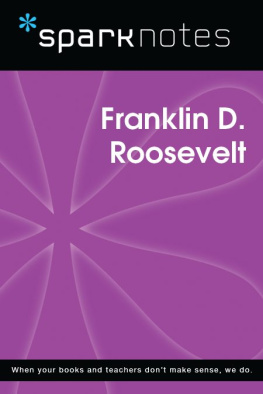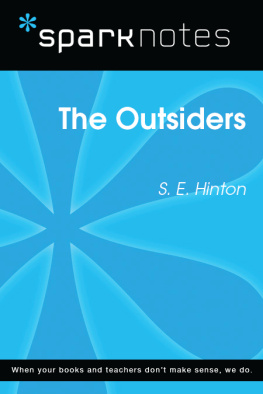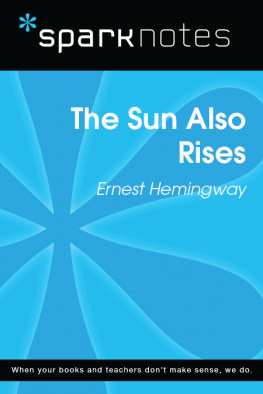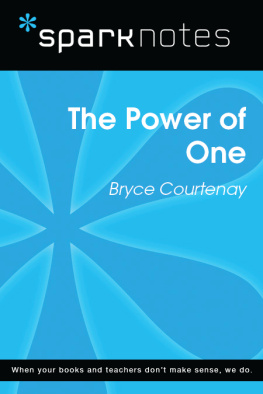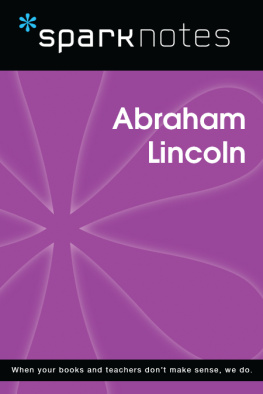Franklin D. Roosevelt
2003, 2007 by Spark Publishing
This Spark Publishing edition 2014 by SparkNotes LLC, an Affiliate of Barnes & Noble
All rights reserved. No part of this publication may be reproduced, stored in a retrieval system, or transmitted in any form or by any means (including electronic, mechanical, photocopying, recording, or otherwise) without prior written permission from the publisher.
Sparknotes is a registered trademark of SparkNotes LLC
Spark Publishing
A Division of Barnes & Noble
120 Fifth Avenue
New York, NY 10011
www.sparknotes.com /
ISBN-13: 978-1-4114-7230-3
Please submit changes or report errors to www.sparknotes.com/.
10 9 8 7 6 5 4 3 2 1
Context
F ranklin Delano Roosevelt, who was in office for an unprecedented four terms, led the United States through two of its greatest crises, the Great Depression and World War II. The extravagance of the Roaring Twenties came to an abrupt end in 1929 with the crash of the stock market. Imprudent investment, a deceptive stock market bubble, and the natural boom and bust of the business cycle led to the beginning of the Great Depression in America. The first three and a half years of the depression were marked by dramatic signs of the nation's poverty: breadlines and soup kitchens in every city, families shivering in tents on the street in the middle of winter, men around fires at railroad tracks. President Herbert Hoover, who had been ushered into office during the prosperity of the twenties, was then swept from office by the Depression. His humanitarian sentiments were tempered by a strong distaste for using federal funds for direct aid to suffering Americans and an equal distaste for deficit spending.
Roosevelt, in the election of 1932, presented a strong contrast to Hoover's seeming impotence in office, and followed through on his promise to wage war against the ravages of the depression. Roosevelt and the new Congress authorized the use of government funds for either direct aid or for job creating programs. Though the relief programs of the New Deal prevented the bottom from falling out of a suffering nation, they did not bring the economic downturn to an end. At the beginning of World War II, the depression was in its eleventh year. There were still nine million people unemployed, despite the expenditure of billions of dollars of federal funds on jumpstarting the economy.
Americans faced a lighter load than many other countries after the First World War. The imposition of harsh war indemnities on the losers of the last battle and the retreat into isolationism of both victors and losers resulted in a worldwide depression. Desperate situations in countries such as Germanywhere inflation was so severe that many people were paid in cash by the wagonload and burned currency to keep warmencouraged the rise of fascist dictators such as Hitler in Germany and Mussolini in Italy. These men took advantage of the desperate situations in their nations to rise to power on a platform of imperialist ambition.
The spirit of isolationism and the poor economic situation in Europe prompted Britain and France to look askance at Germany's violations of the Treaty of Versailles, signed at the end of the First World War. Germany began by imposing compulsory military service for all of its citizens. Since nearly all of Germany's possessions had been destroyed at the end of WWI, their factories began to produce new munitions to outfit a larger army than before. They soon had an army of over six million men with the newest and most potent weapons in the world. When Hitler began to lay claims on lands taken from the country in the Treaty of Versailles, Britain and France, suffering from their own economic problems and reluctant to fight, followed a policy of appeasement for even the most dubious of claims. Yet, Germany continued to be an aggressor. Britain and France reluctantly declared war only when Germany invaded Poland without cause, and their hopes for preventing another large-scale conflict were dashed. In the Far East, the Japanese followed through on their hopes for increased power by invading China in 1937.
The German army quickly routed France, and Britain remained the only hope for a democratic victory. The Japanese continued their attack on China but watched as their resources shrank, and they placed ever-increasing reliance on shipments from an ever more tight fisted America. Americans, however, watched both conflicts with considerable detachment because of the vast oceans that separated them from the aggressors. Roosevelt, with his experience as Assistant Secretary of War during WWI, understood the importance of what was going on across the seas. He had, however, also watched Woodrow Wilson before him try and fail to push foreign policy objectives without the support of the people. Roosevelt thus felt he could only wait, as even aid to Britain was greeted with distrust from an isolationist American populace. Roosevelt could only bide his time or risk losing his power in office.
Yet Germany, perhaps with the memory of the defeat at the hands of American troops in World War I, was reluctant to commit any violence that would require the entry of America into the war. It took the imperialist ambitions of Japan to bring America into the war. Though Roosevelt viewed Japan's aggressions against China with equal dislike as the actions of Germany and Italy, the majority of the American people did not share his view. The invasion of Pearl Harbor in December of 1941, however, became the devastating provocation that Roosevelt needed to rally the country behind him. It was thus with acute political acumen that Roosevelt led the country through the Great Depression and to its victory in World War II.
American industry, under the able leadership of Jimmy Byrnes, met the impossibly high production targets Roosevelt set. The vast numbers of jobs the war created finally managed to end the Depression, which had endured years of government spending that many historians in hindsight say was far too little too late. An Allied invasion of North Africa in November 1942 drove the Germans out and across the Mediterranean, and set the stage for an Allied invasion of Sicily and Italy in the summer of 1943. In the fall of 1943, the leaders of the Allies, Churchill, Roosevelt, and Stalin, met for the first time. Stalin was tired of fighting the war in Europe, and Roosevelt promised to invade Europe by spring of 1944. On June 6, 1944, Allied forces landed on the Normandy coast of France. In August 1944, they liberated Paris and in a month had driven Germany almost entirely out of France. In the Pacific, American forces had newly captured or recaptured all the strategic islands east of Japan, retaken the Philippines, and gotten close to taking Japan itself.
By the time Churchill, Roosevelt, and Stalin met again at Yalta, an Allied victory was almost guaranteed. The results of this meetingthe creation of the UN, the post-war occupation of Germany, and the redistribution of conquered landscan be seen to have the outlines of the future Cold War, and many blame Roosevelt for allowing matters to be decided in such a fashion. However, Roosevelt was aware of the dangers of the Soviet Union and was suitably wary of Stalin. Nonetheless, he was aware that the peace of the world rested on the shoulders of its largest powers, and he acted according to this belief. World War II finally ended with the surrender of Germany in May 1945 and the surrender of Japan in August 1945. Roosevelt had died in April, without ever seeing the outcome of his hard work.
Plot Overview
Franklin Delano Roosevelt was born on January 30,1882. He was born as the beloved only child of James Roosevelt and Sara Delano Roosevelt, both from very good families. He lived a privileged life as a child, taught first by governesses, then attending the newly opened Groton school at fourteen, and Harvard University for his undergraduate degree. He was well respected was elected editor-in-chief of the college paper. Inspired to run for office by his distant cousin "Uncle" Teddy Roosevelt, Roosevelt ran for his first public office, State Senator in New York, in 1910. In three years, aided by his shrewd political acumen and the power of the Roosevelt name and money, he was chosen Assistant Secretary of the Navy, sitting at the same desk that Teddy Roosevelt had sat at in Washington just a few years before.

